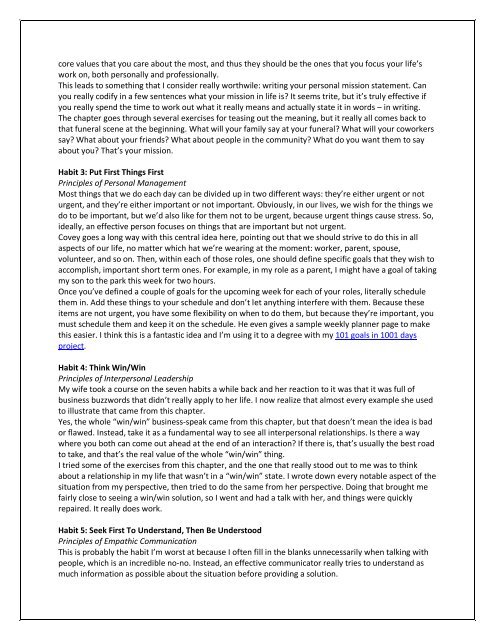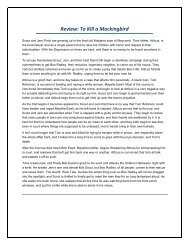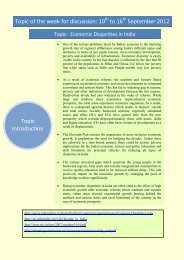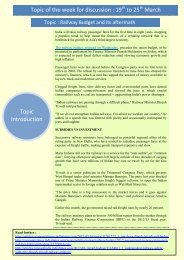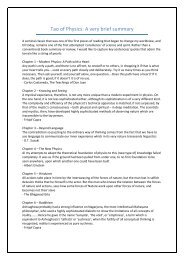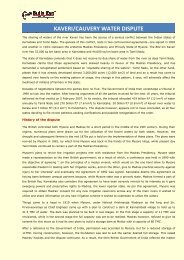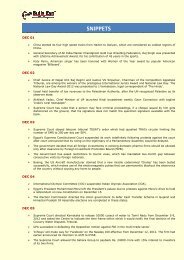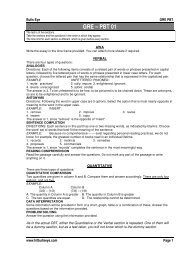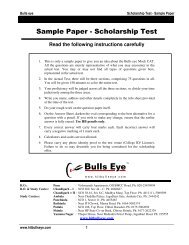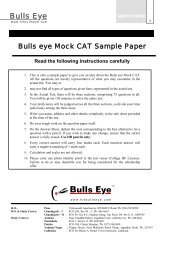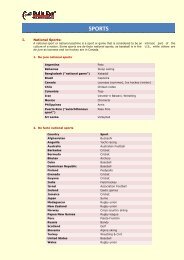Review: The 7 Habits of Highly Effective People - Bulls Eye
Review: The 7 Habits of Highly Effective People - Bulls Eye
Review: The 7 Habits of Highly Effective People - Bulls Eye
You also want an ePaper? Increase the reach of your titles
YUMPU automatically turns print PDFs into web optimized ePapers that Google loves.
core values that you care about the most, and thus they should be the ones that you focus your life’swork on, both personally and pr<strong>of</strong>essionally.This leads to something that I consider really worthwile: writing your personal mission statement. Canyou really codify in a few sentences what your mission in life is? It seems trite, but it’s truly effective ifyou really spend the time to work out what it really means and actually state it in words – in writing.<strong>The</strong> chapter goes through several exercises for teasing out the meaning, but it really all comes back tothat funeral scene at the beginning. What will your family say at your funeral? What will your coworkerssay? What about your friends? What about people in the community? What do you want them to sayabout you? That’s your mission.Habit 3: Put First Things FirstPrinciples <strong>of</strong> Personal ManagementMost things that we do each day can be divided up in two different ways: they’re either urgent or noturgent, and they’re either important or not important. Obviously, in our lives, we wish for the things wedo to be important, but we’d also like for them not to be urgent, because urgent things cause stress. So,ideally, an effective person focuses on things that are important but not urgent.Covey goes a long way with this central idea here, pointing out that we should strive to do this in allaspects <strong>of</strong> our life, no matter which hat we’re wearing at the moment: worker, parent, spouse,volunteer, and so on. <strong>The</strong>n, within each <strong>of</strong> those roles, one should define specific goals that they wish toaccomplish, important short term ones. For example, in my role as a parent, I might have a goal <strong>of</strong> takingmy son to the park this week for two hours.Once you’ve defined a couple <strong>of</strong> goals for the upcoming week for each <strong>of</strong> your roles, literally schedulethem in. Add these things to your schedule and don’t let anything interfere with them. Because theseitems are not urgent, you have some flexibility on when to do them, but because they’re important, youmust schedule them and keep it on the schedule. He even gives a sample weekly planner page to makethis easier. I think this is a fantastic idea and I’m using it to a degree with my 101 goals in 1001 daysproject.Habit 4: Think Win/WinPrinciples <strong>of</strong> Interpersonal LeadershipMy wife took a course on the seven habits a while back and her reaction to it was that it was full <strong>of</strong>business buzzwords that didn’t really apply to her life. I now realize that almost every example she usedto illustrate that came from this chapter.Yes, the whole “win/win” business-speak came from this chapter, but that doesn’t mean the idea is bador flawed. Instead, take it as a fundamental way to see all interpersonal relationships. Is there a waywhere you both can come out ahead at the end <strong>of</strong> an interaction? If there is, that’s usually the best roadto take, and that’s the real value <strong>of</strong> the whole “win/win” thing.I tried some <strong>of</strong> the exercises from this chapter, and the one that really stood out to me was to thinkabout a relationship in my life that wasn’t in a “win/win” state. I wrote down every notable aspect <strong>of</strong> thesituation from my perspective, then tried to do the same from her perspective. Doing that brought mefairly close to seeing a win/win solution, so I went and had a talk with her, and things were quicklyrepaired. It really does work.Habit 5: Seek First To Understand, <strong>The</strong>n Be UnderstoodPrinciples <strong>of</strong> Empathic CommunicationThis is probably the habit I’m worst at because I <strong>of</strong>ten fill in the blanks unnecessarily when talking withpeople, which is an incredible no-no. Instead, an effective communicator really tries to understand asmuch information as possible about the situation before providing a solution.


